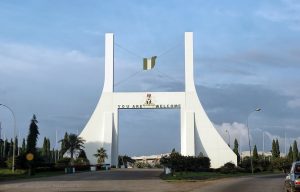In a startling financial disclosure, the Nigerian government has reported that it spent an overwhelming N1.3 trillion on debt servicing during the first quarter of 2024, a figure that starkly contrasts with the N1.76 trillion in total revenue generated in the same period. This expenditure represents a staggering 74% of the government’s revenue, raising significant concerns about the sustainability of Nigeria’s fiscal policies and the implications for economic growth.
The data, released by the Central Bank of Nigeria, reveals that despite a notable increase in revenue—up 33.8% from the previous year—the government is still grappling with a crippling debt burden. The N1.3 trillion allocated for debt servicing not only overshadows personnel costs, which were recorded at N1.15 trillion, but it also eclipses capital expenditures, which fell to N1.15 trillion, marking a 35.9% decrease from the previous year. This alarming trend indicates a critical misallocation of resources, with a significant portion of the national budget being consumed by debt obligations rather than being directed toward essential services and infrastructure development.

The total expenditure for the government in the first quarter of 2024 was reported at N4.59 trillion, a decrease of 12.9% from N5.28 trillion in the same period of 2023. While this reduction may seem beneficial at first glance, it is primarily a consequence of the overwhelming debt servicing costs that continue to plague the nation’s finances. The fiscal deficit also saw a significant decline of 29%, dropping from N3.96 trillion to N2.83 trillion. However, this reduction does little to alleviate the pressing issue of debt management, as the high percentage of revenue allocated to servicing debt remains a significant concern.
The implications of this financial predicament are profound. With 74% of revenue being consumed by debt servicing, the government is left with limited resources to invest in critical areas such as education, healthcare, and infrastructure. This situation not only stifles economic growth but also threatens the well-being of the Nigerian populace, as essential services remain underfunded. The government’s inability to effectively balance its budget raises concerns about its long-term viability and the potential for increased public discontent.
Nigeria’s debt profile has reached alarming levels, with a total debt of N121.67 trillion as of March 31, 2024. This figure encompasses both domestic and external debts, reflecting a broader trend of increasing financial obligations that have accumulated over the years. The Debt Management Office (DMO) has indicated that the recent spike in debt is partly due to new borrowings aimed at financing the 2024 budget deficit. This reliance on borrowing to meet fiscal needs is unsustainable and could lead to a cycle of debt dependency that further complicates the country’s financial landscape.
International financial institutions, including the International Monetary Fund (IMF), have expressed concerns about the rising debt burdens faced by low-income countries, including Nigeria. The IMF has projected that debt servicing could consume as much as 14% of government revenues in the coming years, a stark contrast to the current 74% observed. The global economic environment, characterized by rising interest rates, has intensified the challenges associated with debt servicing, making it imperative for Nigeria to adopt more sustainable fiscal policies.
In response to these challenges, President Bola Tinubu has emphasized the need for urgent reforms to address the nation’s financial woes. He has articulated a vision for breaking the cycle of overreliance on borrowing, asserting that the current trajectory is unsustainable and poses a threat to future generations. The President’s commitment to making “bold decisions” reflects an understanding of the critical need for fiscal discipline and strategic investment in the country’s future.
As Nigeria grapples with these pressing financial issues, the question arises: how can the government effectively manage its debt while ensuring that essential services are funded adequately? The current state of affairs suggests that without significant changes in fiscal policy and a reallocation of resources, the country may continue to face an uphill battle in achieving economic stability and growth.
The stark reality of Nigeria’s fiscal situation serves as a wake-up call for policymakers and citizens alike. With debt servicing consuming such a large portion of government revenue, the nation must find innovative solutions to alleviate this burden and redirect funds towards sustainable development. The path forward may be fraught with challenges, but it is essential for Nigeria to prioritize economic reforms that will foster growth and resilience in the face of mounting debt pressures. Will Nigeria find a way to turn the tide on its debt dilemma, or will it remain trapped in a cycle of financial strain?

